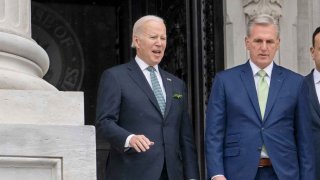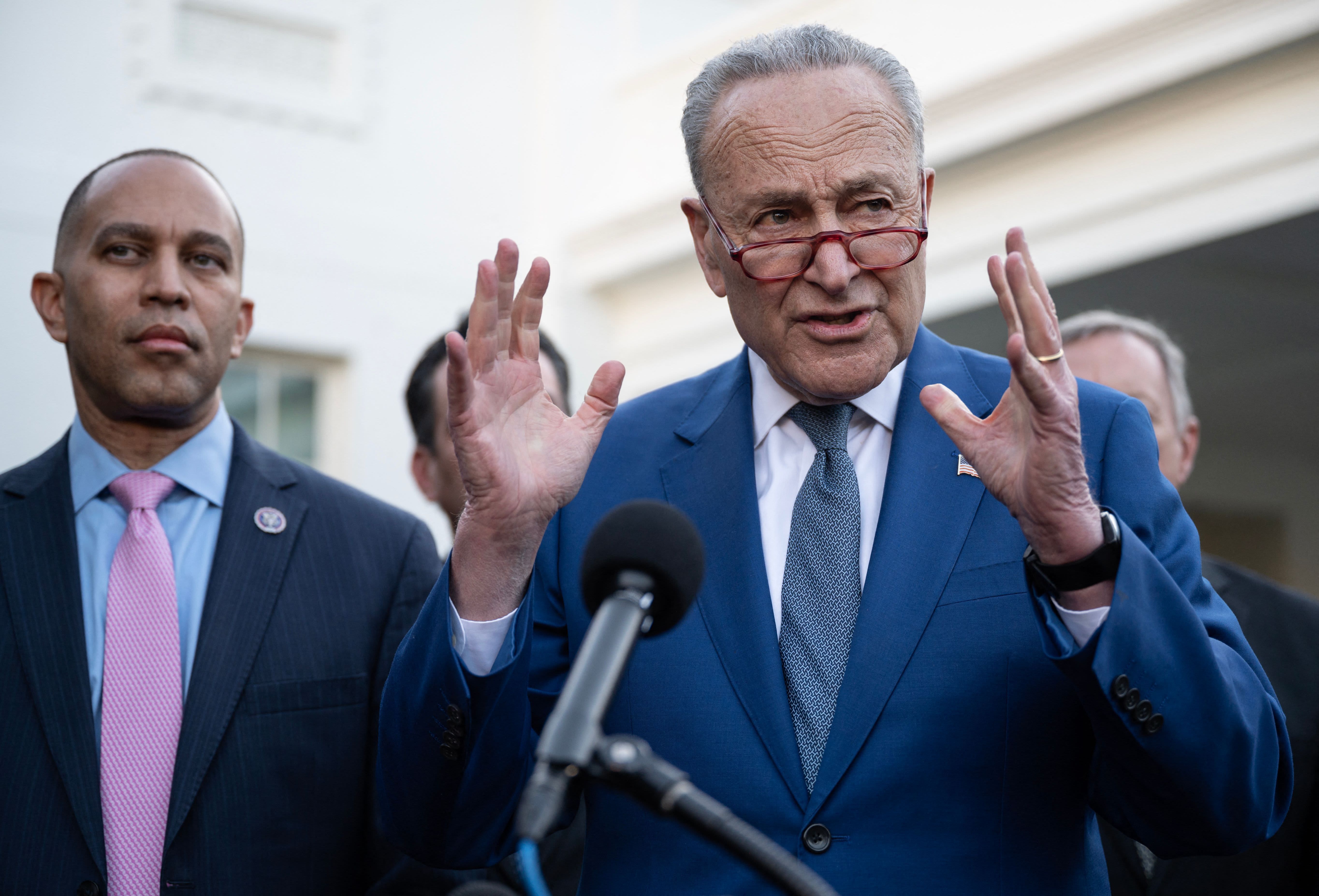
Facing the risk of an unprecedented U.S. government default by month's end, President Joe Biden has invited the top four congressional leaders to face-to-face talks at the White House next week.
It’s the first concrete step toward negotiations on averting a potential economic catastrophe, but there’s a long way to go: Biden and Republicans can’t even agree on what’s up for negotiation.
WHAT'S THE PROBLEM?
If the government's legal borrowing limit of $31.4 trillion is not raised or suspended in the next few weeks, the result could be financial havoc. If the government can't borrow money to keep paying its bills for an extended period, there could be millions of job losses, businesses left bankrupt, crashes piling up across financial markets and lasting economic pain. The damage would be financial, but the cause would be political, a breakdown between Republicans and Democrats, rather than a problem with the underlying health of the U.S. economy.
Get top local stories in Philly delivered to you every morning. >Sign up for NBC Philadelphia's News Headlines newsletter.
The scheduling of next Tuesday's White House meeting suggests that leaders of both parties understand the risks at hand. But it's just a meeting, nothing more so far. There is still a chasm between Democrats and Republicans on what should be done.
WHAT CAUSED BIDEN TO SCHEDULE THE MEETING?
Tax receipts in April were less robust than expected. This means there is less of a financial cushion before the government runs out of money.
The Treasury Department has been using “extraordinary measures” since January to keep the government operating, short-term accounting tweaks to buy lawmakers time.
But Treasury Secretary Janet Yellen now says that time is running short.
"After reviewing recent federal tax receipts, our best estimate is that we will be unable to continue to satisfy all of the government’s obligations by early June, and potentially as early as June 1, if Congress does not raise or suspend the debt limit before that time," Yellen wrote in a letter to lawmakers that became public late Monday.
White House press secretary Karine Jean-Pierre declined on Tuesday to say how the letter might have influenced Biden's thinking.
But after the letter's release, Biden invitations to House Speaker Kevin McCarthy, R-Calif., Senate Majority Leader Chuck Schumer, D-N.Y., House Minority Leader Hakeem Jeffries, D-N.Y., and Senate Minority Leader Mitch McConnell, R-Ky., became public.
WHY NOT MEET IMMEDIATELY?
The U.S. capital runs on calendars — and those can be perpetual obstacles to getting stuff done.
The House is in recess this week. McCarthy was in Jerusalem on Monday, speaking to its Knesset. In his statement reacting to the Yellen letter, he did not mention the White House invite, even though he has been pressing for talks with the president for weeks.
Biden will be in Japan, Papua New Guinea and Australia from May 17 to May 25.
In short, May 9 is when all the principal leaders are in Washington.
WHY CAN'T THEY AGREE?
Though government finances are complex, the divide is simple.
Republican lawmakers want spending cuts in return for raising the debt limit, saying the budget's current path is unsustainable. Biden and congressional Democrats want to raise the debt limit without any conditions, saying any choices about spending should be a separate discussion rather than an excuse for holding the government “hostage.”
Biden has said he won't negotiate about the debt limit, but he is willing to discuss government spending with McCarthy. White House officials say he plans to tell congressional leaders at next week's meeting that the U.S. must avoid a historic default — but also begin separately to put together a fiscal 2024 budget.
“Happy to meet with McCarthy but not on whether or not the debt limit gets extended,” Biden told reporters last week. “That’s not negotiable.”
WHAT'S HAPPENING WITH THE BUDGET?
The president had dared McCarthy to produce a budget plan and the Republican leader delivered. House Republicans narrowly approved a bill to reduce deficits by $4.8 trillion over 10 years. It would do so by cutting discretionary spending to 2022 levels and placing an annual cap of 1% on increases going forward. The bill would also claw back unspent COVID aid, remove the clean energy tax credits that Biden signed into law last year and reverse Biden's student debt forgiveness and repayment plan.
“House Republicans did their job and passed a responsible bill that raises the debt ceiling, avoids default and tackles reckless spending,” McCarthy said in a statement.
It's unclear how the Democrats can get a debt ceiling increase without support from House Republicans. But Democrats say the GOP bill's unspecified budget cuts would harm the economy, as domestic spending would likely be cut by 22% compared to the baseline. Moody's Analytics estimated that the Republican bill would cause the loss of 780,000 jobs next year.
Democratic lawmakers, hoping to generate public opposition, are predicting terrible economic pain.
“Speaker McCarthy has created a situation where he knowingly passed an extreme bill, has been boxed by his Republican colleagues into a corner, and now has little room to maneuver,” Schumer said Tuesday. “McCarthy is giving us two terrible options — either default on the debt or default on our country.”
WOULD REPUBLICANS' SPENDING CUTS ACTUALLY FIX THE DEBT?
Not quite.
The Moody's Analytics estimates indicate that compared to the status quo, the GOP plan would reduce the debt as a share of the overall economy. But the impact would be relatively modest. The long term drivers of the debt that create the challenges of sustainability are Social Security, Medicare and Medicaid. Both McCarthy and Biden have vowed not to cut Social Security and Medicare, popular programs that provide health care and retirement income to older people.
Without deeper cuts, higher taxes or changes to those programs, analyses by the Penn Wharton Budget Model suggest the debt will hit troubling levels in the coming decades.
HOW WILL THIS END?
No one really knows.
Government officials, economists and past aides who handled past debt limit increases are willing to speculate, though they have generally insisted on anonymity to do so.
Administration officials have considered whether Biden could bypass Congress by citing the Constitution’s 14th Amendment that the “validity” of U.S. debt “shall not be questioned.” But the president has long deferred to the legislative branch given his 36 years in the Senate.
Jeffries, the House Democratic leader, said Tuesday his caucus would launch the process to force the House to consider a clean debt ceiling vote under the discharge calendar, though that process could take months.
GOP lawmakers could cave if financial markets panic, Senate Budget Committee Chairman Sheldon Whitehouse, D-R.I., and others have suggested. A possible deal might be struck that includes permit reform for energy projects that Republicans and Biden have both sought.
Most likely: Democrats and Republicans could agree to a short-term extension, which would prevent a default but keep the issue pending until a budget was agreed to.
___
AP congressional correspondent Lisa Mascaro contributed to this report.



